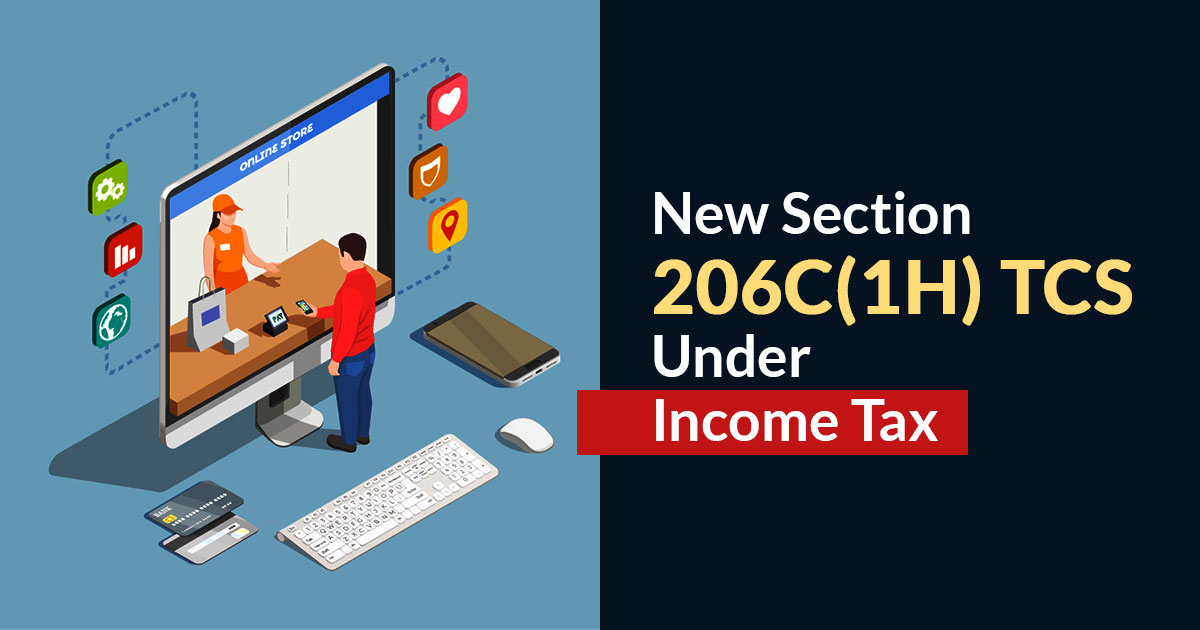
Now new Income Tax Compliance has been brought into effect by the Central Board of Direct Taxes that shall be applicable retrospectively with effect from October 1, 2020. In an attempt to widen the tax net, the government of India has stretched the scope of the Tax collected at Source (TCS) by adding a new subsection (1H) that shall be called section 206C (1H) of the Income Tax Act, 1961 with reference to the Tax Collected at Source.
Domain of Section 206C (1H)
“Every person, being a seller, who receives any amount as consideration for the sale of any goods of the value or aggregate of such value exceeding 50 lakh rupees in any previous year, other than the goods being exported out of India or goods covered in sub-section (1) or sub-section (1F) or sub-section (1G) shall, at the time of receipt of such amount, collect from the buyer, a sum equal to 0.1 per cent of the sale consideration exceeding fifty lakh rupees as income tax”.
The above-mentioned provision connotes that each seller who has received any amount in the form of sale consideration that is above Rs 50 lakhs has to collect 0.1% of the bill amount from the aforesaid buyer, collect PAN and pay TCS every month.
Date of Application Section 206C (1h)
It shall be applicable to all those sellers of goods whose turnover exceeds Rs 10 crores for the preceding financial year. It means that if during the financial year 2019-20, the turnover of the seller has exceeded Rs 10 crores, then with effect from October 1, 2020, and for the financial year 2020-21, this provision shall be applicable to aforesaid sellers.
However, This provision has applied from October 1, 2020.
Implication of Section 206C (1H)
Section 206C (1H) is a provision under the Income Tax Act, 1961 of India. It pertains to the collection of tax at source on the sale of goods. The provision requires a person responsible for paying to a resident any sum as consideration for the sale of goods, to deduct tax at the rate of 1% if the payment exceeds fifty lakh rupees in the financial year.
Buyer Definition As per Section 206C (1H)
Buyer includes an individual who purchases any goods but does not include the entities i.e. The Central Government, the State Government, the Embassy, the High Commission, and so on of a foreign state are not included in the domain of the buyer.
- The Local Authority shall also not be included
- A Person importing goods in India shall not be included
- Any person as per notification of the Central Government shall not be included.
Who is Seller As per Section 206C (1H)?
Seller includes a person whose total sales turnover or gross receipts from the business that is carried on by him exceeds Rs 10 crores and does not include a person who is notified by the official gazette of the government. The following points shall make clear the aforesaid definition.
- A business which started in the FY 2020-21 shall not be liable to collect the TCS.
- The payment received on or after October 1, 2020, related to the sales made before October 1, 2020, shall be liable for TCS.
- The Tax Collected at Source shall be collected from the buyer to whom sales exceeding Rs 50 lakhs have been made annually. For Instance, in the case of a sale of 70 lakhs to a single buyer, TCS is necessary to be collected at the rate of .1% on Rs 20 lakhs only.
- If a person does not hold a Permanent Account Number (PAN) or Aadhar Card, a rate of 1% shall be imposed instead of .1%.
- The TCS shall not be made applicable where TDS is being deducted or TCS is being collected.
- This provision shall not be applicable in the case of exporting goods and sales that have been made to the government.
List of Qualifications U/S 206C of TCS
The eligibility criteria under Section 206C of TCS include the following points:
- This provision is applicable only to sellers whose total revenue in the financial year prior to the sale exceeds Rs. 10 crore
- Items are taken under exports or those included by Section 206C(1) – TCS is applicable on the sale of tendu leaves, forest produce, alcohol, and scrap; 206C(1F) – Motor vehicles sales are liable for TCS; and 206C(1G) – TCS applicable on external settlement
- TCS is not required to be collected if the buyer is a Central or State Government, Embassy, High Commission, Legation, Consulate, Trade Representation of a Foreign State, or any local authority
- It is not mandatory for the seller to collect TCS on transactions in instances where the buyer is needed in accordance with any other regulation of the Income Tax Act to deduct TDS from the goods purchased through the seller, and they have done so
- Items that are imported into India do not come under this rule
What are the Eligible Items and Tax Rates Specified in Section 206?
Here is a list of eligible items specified in Section 206, with their respective tax rates:
- Timber is acquired through a forest lease with a tax rate of 2.5%.
- A tax rate of 5% on tendu leaves
- Scrap with a tax rate of 1%
- Timber acquired through means other than a forest lease with a tax rate of 2.5%
- Minerals, including coal, ignite, or iron ore, with a tax rate of 1%
- Forest produce, excluding tendu leaves and timber, with a tax rate of 2.5%
Note: Goods purchased by an Indian resident for the purpose of manufacturing or producing other items, as compared to trading, are exempt from tax, according to Section 206C of the Income Tax Act. Buyers are required to file an application and provide a copy to the Income Tax Department commissioner within 7 days of completing the sale.